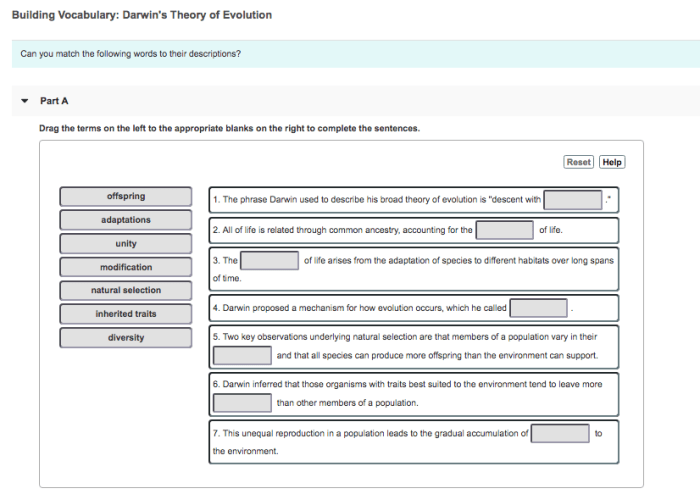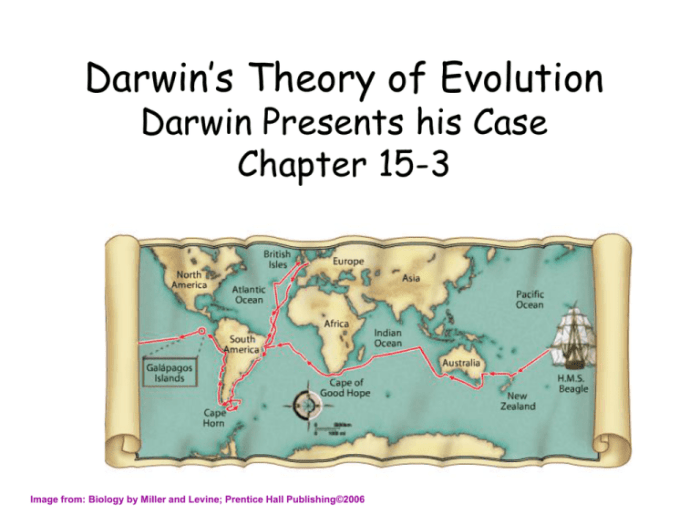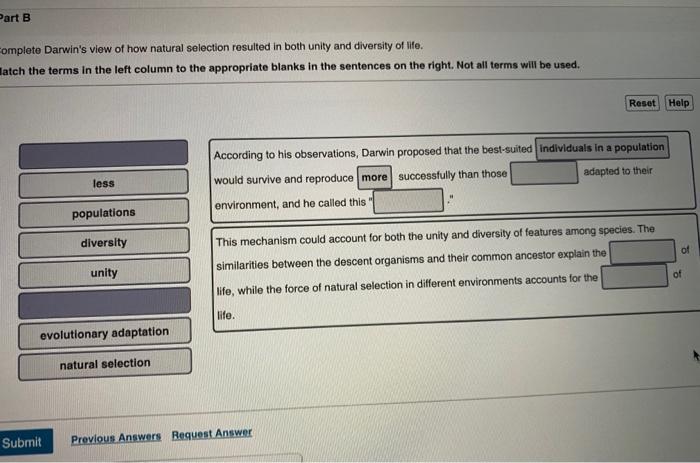Building vocabulary darwin’s theory of evolution – Building vocabulary related to Darwin’s Theory of Evolution is crucial for understanding the fundamental principles of evolution, natural selection, and genetic variation. This guide provides a comprehensive overview of key terms and concepts, along with engaging activities and resources to enhance vocabulary development.
Darwin’s Theory of Evolution explains the diversity of life on Earth through the process of natural selection. By understanding the key terms and concepts associated with this theory, individuals can gain a deeper understanding of the mechanisms that drive evolution and the impact it has on the living world.
Darwin’s Theory of Evolution

Charles Darwin’s theory of evolution is a cornerstone of modern biology. It explains the diversity of life on Earth and the mechanisms that drive evolutionary change.
Fundamental Principles
- Natural selection: Individuals with traits that enhance their survival and reproduction in a particular environment have a greater chance of passing on those traits to their offspring.
- Genetic variation: Populations contain individuals with different genetic variations, which can provide advantages or disadvantages in different environments.
- Speciation: Over time, populations can diverge into new species as a result of reproductive isolation and the accumulation of genetic differences.
Applications
- Explaining the diversity of life on Earth, from the smallest microorganisms to the largest whales.
- Understanding the evolution of antibiotic resistance in bacteria.
- Developing new drugs and treatments based on insights into evolutionary processes.
Building Vocabulary Related to Darwin’s Theory of Evolution

Understanding Darwin’s theory of evolution requires a strong vocabulary. Key terms include:
Key Terms and Concepts, Building vocabulary darwin’s theory of evolution
- Adaptation: A trait that enhances an organism’s survival and reproduction in a particular environment.
- Allele: A variation of a gene.
- Fitness: The ability of an organism to survive and reproduce in a particular environment.
- Mutation: A change in the DNA sequence.
- Natural selection: The process by which individuals with advantageous traits have a greater chance of passing on those traits to their offspring.
- Speciation: The process by which populations diverge into new species.
Examples of Vocabulary Building Activities
To enhance vocabulary related to Darwin’s theory of evolution, consider the following activities:
Interactive Exercises
- Matching games to pair key terms with their definitions.
- Crosswords or word searches that require students to fill in terms related to evolution.
- Simulations that allow students to observe and analyze evolutionary processes.
Resources for Building Vocabulary: Building Vocabulary Darwin’s Theory Of Evolution

Expand your vocabulary related to Darwin’s theory of evolution with the following resources:
Recommended Sources
- Books: “Evolution: What the Fossils Say and Why it Matters” by Donald Prothero.
- Articles: “The Importance of Vocabulary in Science” by the National Science Teaching Association.
- Websites: The University of California Museum of Paleontology’s “Evolution 101” section.
FAQ Compilation
What are the key terms related to Darwin’s Theory of Evolution?
Key terms include natural selection, genetic variation, adaptation, fitness, and speciation.
How can I improve my vocabulary related to Darwin’s Theory of Evolution?
Engage in interactive exercises, read books and articles, and utilize online resources such as dictionaries and thesauruses.
What are the benefits of building vocabulary related to Darwin’s Theory of Evolution?
Enhanced understanding of evolutionary processes, improved communication skills, and a deeper appreciation for the scientific principles that shape our understanding of the natural world.